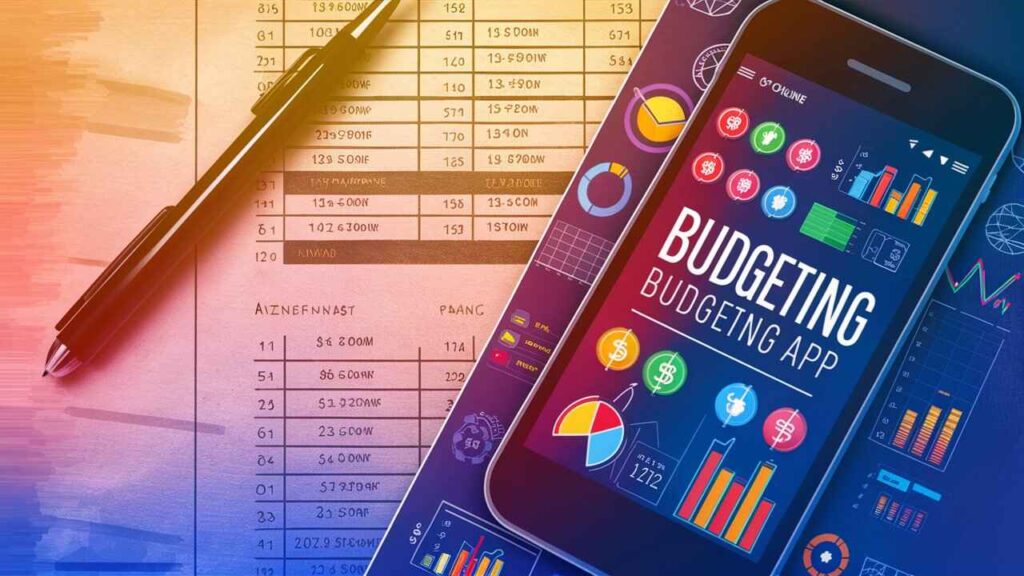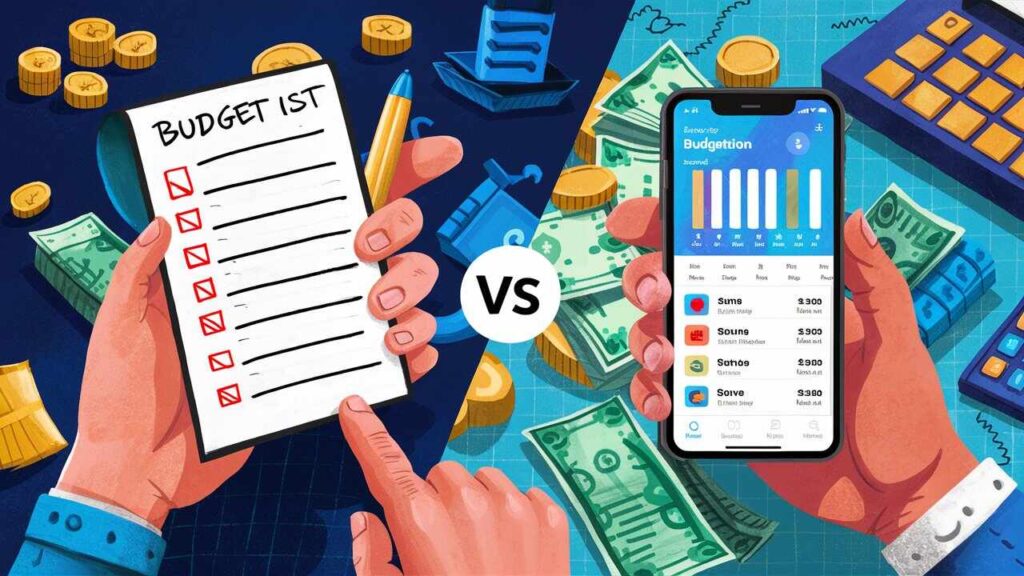In the high-stakes game of personal finance, choosing the right budgeting tool can make or break your financial goals. It’s the age-old debate: should you embrace the digital revolution with online budgeting apps, or stick to the tried-and-true pen-and-paper method? Let’s dive into this financial face-off and see which method might be your ticket to fiscal fitness. Are Online budgeting apps better than pen and paper?
Are online budgeting apps more effective than pen and paper?
Picture this: You’re at the grocery store, wondering if you can splurge on that fancy cheese. With an app, you’d know in seconds. With pen and paper? Well, hope you brought your notebook! This scenario highlights the key difference between these methods – convenience.
but let’s not judge an e-book by using its cover. Both methods have their champions. Take Sarah, a tech-savvy millennial who swears by her budgeting app. “it is like having a monetary marketing consultant in my pocket,” she says. On the flip side, there’s Bob, who’s been balancing his checkbook for 40 years.” I agree with my own two arms,” he insists.
The truth? Both can work wonders. Here’s a quick comparison:
| Feature | Online Apps | Pen and Paper |
|---|---|---|
| Real-time updates | Yes | No |
| Automatic categorization | Yes | No |
| No internet required | No | Yes |
| Physical record | No | Yes |
| Data visualization | Yes | No |
What does a budget show you?
A budget is your financial mirror, reflecting the good, the bad, and the ugly of your spending habits. It’s not just about numbers; it’s about insights.
Income vs.
- Expenses: This is the meat and potatoes of budgeting. Are you living within your means, or is your money flying out faster than it’s coming in?
- Spending Patterns: Maybe you’re spending a small fortune on coffee without realizing it. A budget brings these hidden money drains to light.
- Progress Tracking: Want to buy a house? A budget shows you if you’re on track or if you need to kick it up a notch.
- Financial Health: It’s like a doctor’s check-up for your wallet. Are you financially fit, or do you need to go on a spending diet?
Both apps and traditional methods can show you these things, but apps often present the data in eye-catching graphs and charts. It’s like the difference between reading a textbook and watching an engaging documentary. Are Online budgeting apps better than pen and paper?
Why is budgeting so important?

Why is budgeting so important?
Budgeting isn’t just for bean counters and misers. It’s a superpower that can transform your financial life. Here’s why:
Financial Control: You’re the captain of your money ship. A budget is your navigation system.
Peace of Mind: Know where your money’s going, and suddenly, those 3 AM money worries might just disappear.
Future Planning: Want to retire on a beach? A budget helps you plot the course.
Debt Reduction: It’s your debt-busting superhero.
"A budget is telling your cash in which to move instead of wondering in which it went." - Dave RamseyWhether you’re a team app or a team paper, the importance of budgeting remains the same. It’s your financial roadmap, guiding you from where you are to where you want to be.
Convenience and accessibility
In the red corner, weighing in with lightning-fast updates and cloud syncing, we have online budgeting apps! And in the blue corner, with the reliability of physical presence and no need for charging, we have traditional methods!
Apps offer the convenience of having your budget at your fingertips 24/7. Forgot how much you budgeted for dining out. A glance at your phone, and you’re sorted. Traditional methods, however, offer a different kind of accessibility. There’s something satisfying about sitting down at your desk, pen in hand, ready to tackle your finances. Are Online budgeting apps better than pen and paper?
Accuracy and Organization
When it comes to number crunching, apps have a clear advantage. They can automatically pull transactions from your bank, categorize them, and update your budget in real-time. No more “I’ll enter it later” excuses!
But don’t count out the traditional method just yet. The act of physically writing down expenses can make you more mindful of your spending. Plus, for some, the satisfaction of a neatly written ledger is hard to beat.
Customization and Features
Apps are the Swiss Army knives of budgeting. Want to set alerts for when you’re close to overspending? Done. Need to split transactions between categories? Easy peasy. Some apps even offer investment tracking and bill reminders.
Traditional methods shine in their flexibility. Want to create a category for “Zombie Apocalypse Preparedness”? Go for it! Your budget, your rules. Are Online budgeting apps better than pen and paper?
Cost and access
Many budgeting apps offer free versions, but the best features often come with a price tag. Traditional methods require an upfront investment in supplies, but then you’re set.
Consider this breakdown:
| Method | Initial Cost | Ongoing Cost | Additional Requirements |
|---|---|---|---|
| Apps | Free – $60/year | $0 – $15/month | Smartphone or computer |
| Traditional | $10 – $30 | $0 – $10/year | None |
Security and Privacy
In our digital age, data security is a hot topic. Apps use bank-level encryption to protect your data, but they’re not immune to breaches. Traditional methods? Unless someone breaks into your house and steals your budget book, your data is safe.
However, paper can be lost, damaged, or destroyed. Digital methods often offer cloud backups, ensuring your budget survives even if your device doesn’t. Are Online budgeting apps better than pen and paper?
Conclusion
So, what works best? The answer isn’t one-size-fits-all. It depends on your lifestyle, tech-savviness, and personal preferences.
Consider a hybrid approach. Use an app for day-to-day tracking and automated features, but sit down with pen and paper for monthly reviews and goal setting. This way, you get the first-class of each world.
Remember, the best budgeting method is the one you’ll use. Whether you’re a team app or team traditional, the important thing is to start budgeting. Your future self will thank you!
Ready to take control of your finances? Pick a method and start your budgeting journey today.
FAQs
Ans: Setting up a budget with an app typically takes 30 minutes to an hour, depending on how many accounts you’re linking. Traditional methods might take 1-2 hours initially, as you’ll need to gather all your financial information manually. However, the setup time can vary based on your financial complexity and familiarity with the chosen method.
Ans: Absolutely! Many users report significant savings after using budgeting apps. For example, Mint users saved an average of $600 in their first year. Apps help by providing visibility into your spending habits and offering savings suggestions. However, remember that the app is a tool – you’ll still need to make and stick to financial decisions.
Ans: If you’re not comfortable with technology, traditional methods might be less stressful for you. However, many budgeting apps are designed to be user-friendly. You might start with a simple app and gradually move to more feature-rich options as you become more comfortable.
Ans: Absolutely! Many people try different methods before finding what works best for them. If you’re switching from traditional to digital, most apps allow you to input past data. If you’re moving from digital to traditional, you can usually export your data to use as a starting point.
Ans: Not necessarily. Many free apps offer robust features suitable for most users. Paid versions often offer additional features like credit score monitoring or investment tracking. Assess your needs and try free versions before committing to a paid app.





